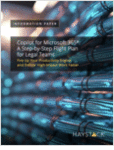Apple Inc. is often portrayed as the aggressive party in patent litigation, but now the iPhone and iPad maker seems to be reckoning with some bad IP karma: today Apple was targeted in two separate IP lawsuits, and a federal court judge restored its chief rivals right to sell a tablet computer.
Samsung Electronics Co.which was slammed with a $1.05 billion jury verdict in California in August when it lost a huge patent lawsuit to Appleis alleging in court filings that the Cupertino-based companys new iPhone 5 infringes its patents. The company added the claims to a separate patent infringement lawsuit, filed in April, that alleges Apple has infringed Samsung patents in its earlier iPhones, laptops, desktops, and in Apple TV. That case is expected to go to trial in March 2014.
As soon as the iPhone 5 was available for purchase, Samsung began its investigation of the product, the company said.
The ongoing battle between Samsung and Apple for supremacy in the global smartphone market has pitted the two companies against one another in courts across the globe. Both have won some victories and suffered some defeats, although Apples $1.05 billion jury award struck Samsung particularly hard.
We have always preferred to compete in the marketplace with our innovative products, rather than in a courtroom, Samsung said in a statement Tuesday. However, Apple continues to take aggressive legal action that will restrict market competition. Under these circumstances, we have little recourse but to take the steps necessary to protect our innovations and intellectual property rights.
Samsung claims the iPhone 5 infringes two standard patents and six feature patents. These include a way to synchronize photos, music, and video files across several devices, and a method to capture and send video over the Internet.
The addition of the iPhone 5 to the pending lawsuit came just as a federal judge issued an order dissolving a three-month-old ban on sales of Samsungs Galaxy Tab 10.1 in the U.S. The ban was put in place before the August trial in California, with the stipulation that it could be reversed if the jury determined that Samsung did not infringe Apples tablet design patent. The jury found Samsung guilty of infringing many Apple patents, but not that specific one. Still, Apple had objected to the dissolution of the ban.
While Samsung was attacking Apple on one flank, the computer and smartphone maker was getting hit from another by a software developer that claims Apple has infringed on four of its patents [PDF] in its recently released iOS 6 Passbook app.
Ameranth, which describes itself as a provider of wireless and web-based solutions for the hospitality and gaming markets, is seeking treble damages for Apples infringement of the four patents. The patents revolve around mobile payments, point-of-sale systems, and other issues related to Passbooks ability to digitize hotel bookings, airline tickets, reward cards, and coupons.
This content has been archived. It is available through our partners, LexisNexis® and Bloomberg Law.
To view this content, please continue to their sites.
Not a Lexis Subscriber?
Subscribe Now
Not a Bloomberg Law Subscriber?
Subscribe Now
LexisNexis® and Bloomberg Law are third party online distributors of the broad collection of current and archived versions of ALM's legal news publications. LexisNexis® and Bloomberg Law customers are able to access and use ALM's content, including content from the National Law Journal, The American Lawyer, Legaltech News, The New York Law Journal, and Corporate Counsel, as well as other sources of legal information.
For questions call 1-877-256-2472 or contact us at [email protected]





